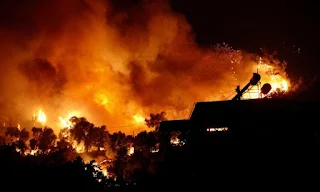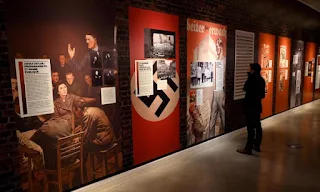The repercussions of Hariri's retirement on Lebanon and its Sunnah
Beirut - Naim Berjawi: A few months before the parliamentary elections, on May 15, the political scene in Lebanon was shaken by the decision of Saad Hariri , the former prime minister and head of the "Sunni" Future Movement bloc, to "suspend" his political work.
According to experts and political analysts, this decision may have significant negative repercussions on the Sunni community and internal stability in Lebanon, especially as it comes in light of two political and economic crises that the country has been experiencing for some time.
On Monday, 51-year-old Hariri announced, in a press conference, that he “suspended” his work in political life and that he would not run for the upcoming parliamentary elections, and not submit any nominations from his “Future Movement” for these elections.
He considered that "there is no room for any positive opportunity for Lebanon in light of Iranian influence, international confusion, national division, sectarianism and the state's wear and tear."
Regional and Western capitals and Lebanese political forces accuse Iran of dominating state institutions in Lebanon, through its ally, "Hezbollah" (Shiite), which Tehran and the party deny.
Hariri added that the prevention of the civil war imposed on him “compromises that came at his expense,” including his visit to Damascus in 2009, and the election of Michel Aoun as president in 2016, and this may be the reason for not achieving a better life for the Lebanese, according to his assessment.
Supporters of the "Future Movement", led by Hariri, staged protests in the capital, Beirut, on Monday, demanding that it continue its political work and run for elections, considering it "the only political representative of the Sunni community in Lebanon."
For the first time, Hariri was elected as a member of Parliament for Beirut in 2005, then was re-elected in 2009, and was elected for the third time in 2018, while he headed the government three times in 2009, 2016 and 2018.
More crises
Ali Hamadeh, a political analyst, told Anadolu Agency that "Hariri's talk about settlements during his conference on Monday came in the sense that Hezbollah may ignite a civil war, if it does not obtain the concessions it wants."
He suggested that "things in Lebanon are going towards more complications and crises, and therefore Hariri does not want to have any role in the explosion of the situation in the country."
He believed that "Hariri's stepping down from political life will increase the possibility of postponing the elections, especially since this (his decision) may lead to a greater withdrawal within the Sunni community, and thus the country will fall into a sectarian crisis."
Hamadeh warned against “the possibility of clashes in the street at any moment because the country suffers from accumulations that are years old, caused by the feeling of many Lebanese components that their decision has been hijacked, and that they are subject to the tutelage and hegemony of Hezbollah.”
And he considered that "in the absence of a leading figure like Hariri, capable of controlling the Sunni street, it is possible that things could get out of control in the street, and witness a security deterioration, especially in the event of Saddam's fall with Hezbollah."
Hariri entered politics after the assassination of his father, Rafik Hariri, the former prime minister, in an explosion in Beirut on February 14, 2005. Political forces accused the Syrian regime and Hezbollah of assassinating him in exchange for their exile.
In 2020, the Special Tribunal for Lebanon convicted in absentia Salim Ayyash, a member of Hezbollah, while acquitting 3 other defendants belonging to the party, and considered that there was no evidence that the “Hezbollah leadership” had a role in the assassination, as well as no direct evidence. On the “involvement of Syria” (the Syrian regime) in the crime.
The price of his stance
Agreeing with Hamada, Faisal Abdel Sater, a political analyst close to Hezbollah, said that Hariri's decision will have repercussions on the political scene, and perhaps on the elections, the functioning of the government, and the economic situation in the country.
For two years, Lebanon has been experiencing the worst economic crisis in its history, with the collapse of its currency, the lira, a shortage of medicines, fuel and other basic commodities, and a sharp decline in the purchasing power of its citizens.
In an interview with Anadolu Agency, Abdel Sater said, "Hariri paid the price for his political stances, because he was not seeking to create (sectarian) strife in Lebanon."
And he considered that “some internal parties from other sects had hidden intentions that the confrontation in Lebanon would be exclusively between the Future Movement and Hezbollah, or between Sunnis and Shiites, and that they would remain aside from this conflict.”
There is no alternative in the Sunni arena
According to Samir Skaf, an activist and political analyst, “Hariri’s problem is basically not confronting Hezbollah’s project, and allowing it to confront the Arab countries, especially the Gulf states, and this is what led to Hariri incurring losses after the other internally and externally.”
In an interview with Anatolia, Skaf pointed out that "one of the losses that befell Hariri is his acquiescence to Hezbollah's pressure to bring his ally Michel Aoun to the presidency of the country through a settlement concluded by Hariri in 2016."
He continued, "All of this made Hariri a weak position towards Sunni public opinion, and thus lost Arab support, and anyone who follows the same style of Hariri will reach a similar end."
Historically, the relationship between Beirut and Riyadh was warm, especially with Rafik Hariri, who took over as prime minister in the early nineties of the last century, and even after his assassination in 2005, the relationship continued with his son Saad.
But this relationship was shaken in 2016, following a settlement that brought Aoun (Hezbollah’s ally) as president of the republic and Hariri as prime minister. The following year, Hariri resigned, through a televised speech from Riyadh, in mysterious circumstances, before retracting it from Beirut.
Skaf ruled out the presence of Sunni political figures capable of filling the void after Hariri, considering that "Prime Minister Najib Mikati is unable to do so, as he is using the same method that Hariri follows, which is to appease Hezbollah and submit to it in the latter's confrontation with the Arab countries."
He suggested the rise of some personalities on a regional level, especially those who raise the slogan of “confronting” Hezbollah, such as MP Fouad Makhzoumi in Beirut, former Minister Ashraf Rifi in Tripoli, and Bahaa Hariri, Saad’s brother, who more than once expressed frank positions against the party.(Anatolia)
Three migrant children die in fire in Morocco
Rabat: Three children of a Nigerian immigrant died in Morocco, in a fire that suffocated and charred their bodies in a temporary shelter in Gorogo in the northwest of the country, the Moroccan Association for Human Rights announced Tuesday.
"The mother lit a fire inside the shelter to warm her young," said Mohamed Amin Abidar, head of the local branch of the association, explaining that the children "suffocated to death on Monday morning and then were burned by the fire that broke out in their temporary tent."
The mother was taken "in critical condition" to a hospital in Nador, the border town next to the Spanish enclave of Melilla.
More details could not be obtained from the authorities.
Over the years, the Gorogo mountain range has become a refuge for many migrants from sub-Saharan Africa who seek to cross a triple fence of about 12 kilometers long to reach Melilla.
Abidar condemned the deaths of the three children, describing it as a "horrific tragedy." "Migrants in this region live in precarious and inhumane conditions," he said.
The Moroccan Association for Human Rights is the largest human rights organization in Morocco.
And the borders with Melilla and Ceuta, the other Spanish enclave in Moroccan territory, are the only land link between Africa and the European Union, so for years it has been facing very great pressures to emigrate.(AFP)
Yediot: The first Holocaust exhibition of its kind opens in Indonesia
The Hebrew newspaper, Yedioth Ahronoth, revealed the holding of the first exhibition to commemorate the Holocaust in Indonesia.
The newspaper, quoting Israeli officials, said that although Israel does not have official diplomatic relations with Indonesia, the museum that will be organized through a Jewish institution in Jerusalem will be held this year in it.
The newspaper indicated, in a report published on Wednesday, that the Jerusalem-based Yad Vashem Foundation will commemorate the International Holocaust Remembrance Day, tomorrow, Thursday, with the opening of the first permanent exhibition on the genocide of the Jews by the Nazis during World War II. On an Indonesian island.
She explained that the exhibition, entitled "The Holocaust - How Was It Humanly Possible", will open its doors at the Sha'er Hashmaym Synagogue on the Southeast Asian island of Sulawesi, and will serve as a permanent museum for the Holocaust.
And she continued: “Although Israel does not have official diplomatic relations with the largest Muslim country in terms of population, the representative of the International School for Holocaust Studies will participate in the opening ceremony of the exhibition virtually via video technology, as the exhibition is scheduled to include archival materials summarizing daily life. for the victims of the Holocaust.
"We see great importance in providing Yad Vashem's content financially outside Jerusalem, and we are happy to cover new areas in Indonesia," Yediot quoted Danny Dayan, president of Yad Vashem, as saying.
He added, "We will be happy to open an exhibition wherever there is interest in the memory and remembrance of the Holocaust, especially in the largest Muslim country in the world."
He stressed that the exhibition in Indonesia is one of 65 print-ready exhibitions supervised by Yad Vashem to celebrate the International Day of Holocaust Remembrance, which will be displayed in schools, universities and community centers around the world.



